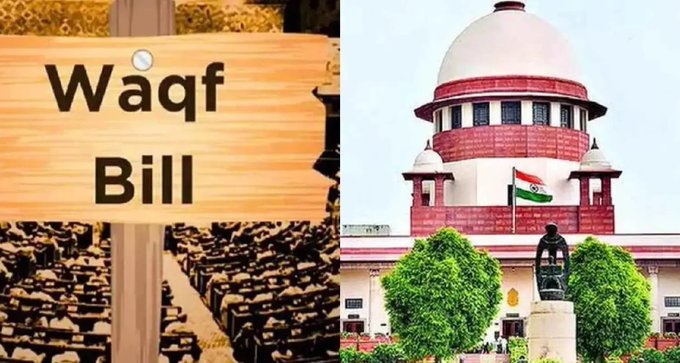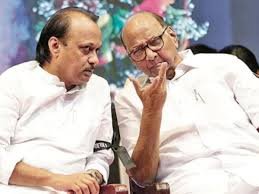As the Supreme Court hears petitions challenging the Waqf (Amendment) Act, key concerns emerge about religious equity and property management. While the government defends the law as an inclusive reform, critics argue it undermines essential constitutional rights, raising questions about its broader impact on religious freedom and historical practices.
BY PC Bureau
The Supreme Court of India, on Wednesday came to the aid of the Muslim community in the #WaqfAmendmentAct2025 case and proposed interim orders that protect Waqf lands from de-notification and maintain the integrity of Waqf institutions. Justice prevails.
Th court raised concerns about the inclusion of non-Muslims in the Central Waqf Council and questioned whether the government would allow Muslims to be part of Hindu endowment boards. This came while hearing a batch of petitions challenging the constitutional validity of the Waqf (Amendment) Law.
A bench led by Chief Justice Sanjiv Khanna, along with Justices Sanjay Kumar and K V Viswanathan, highlighted potential issues arising from the “undoing of Waqf by user.” The bench noted that such a move could lead to significant problems, especially when considering properties that have been in continuous use for religious purposes over many generations.
The court was set to pass the following interim order ( as per Live law) before it entertaienda request by Solicitor General Tushar Meht to hear him further. Howecver the corut indicated it could pass the following interim order: : 1. The properties declared by Courts as Waqfs should not be de-notified as Waqfs, whether they are by waqf-by-user or waqf by deed, while the Court is hearing the challenge to the Waqf Amendment Act 2025.
#BREAKING #SupremeCourt says that it is proposing to pass an interim order as follows in the petitions challenging the Waqf Amendment Act 2025 :
1. The properties declared by Courts as Waqfs should not be de-notified as Waqfs, whether they are by waqf-by-user or waqf by deed,…
— Live Law (@LiveLawIndia) April 16, 2025
2. The proviso of the Amendment Act, as per which a Waqf property will not be treated as a Waqf while the Collector is conducting inquiry whether the property is a Government land, will not be given effect to.
3. The Court also says it will consider that all Members of the Waqf Boards and Central Waqf Council must be Muslims, except the ex-officio members.
The bench then focused on the composition of the Central Waqf Council under the new law, with CJI Khanna questioning the government’s stance. “Mr. Mehta, are you saying that you will allow Muslims to be part of Hindu endowment boards? Say it openly,” CJI Khanna asked Solicitor General Tushar Mehta, who was representing the Centre.
The court also inquired about the feasibility of disallowing “waqf by user,” questioning how many properties could meet the documentation requirements to be registered as Waqfs. The bench pointed out that many mosques built centuries ago, such as those from the 14th and 15th centuries, could not possibly have the formal documentation required. “How will you register such Waqfs by user? What documents will they have? It will lead to undoing something. Yes, there is misuse, but there are also legitimate Waqfs,” said the bench, which also referenced judgments from the Privy Council that had recognized “Waqf by user” as a legitimate practice.
READ: Black-Market Fuel and Unsafe Roads Choke Life in Manipur’s Hills ( Part-1)
“Waqf by user” refers to a long-established practice where properties, including mosques and other religious or charitable establishments, are recognized as Waqf based on continuous and uninterrupted use for such purposes, even if they lack formal written declarations by the original owners.
While defending the law, Solicitor General Mehta argued that the new Waqf Act is more inclusive, as it now allows representation from various Muslim sects, including those outside the Sunni and Shia communities. He also mentioned that a significant portion of Muslims did not want to be governed by the Muslim Waqf Board.
However, the bench pressed on with its questioning, asking Mehta, “Are you saying that from now on, you will allow Muslims to be part of Hindu endowment boards?” The Supreme Court emphasized that public trusts declared as Waqf hundreds of years ago should not be retroactively altered by the Waqf board, pointing out that such properties cannot be “reclaimed” as Waqf if they were not originally registered as such.
“You cannot rewrite the past,” the bench stated, emphasizing that the law could not undo centuries-old practices without substantial legal and factual justification.
Solicitor General Mehta responded by detailing the extensive parliamentary process through which the law passed, with a joint parliamentary committee holding 38 sittings and examining over 98 lakh memorandums before the law’s passage. However, the bench still sought clarification on several points and raised two crucial questions: whether the petitions should be relegated to the High Court and what specific arguments the petitioners were advancing.
Meanwhile, the Centre recently notified the Waqf (Amendment) Act, 2025, after it was passed in Parliament and received President Droupadi Murmu’s assent on April 5. Several Muslim organizations, including the All India Muslim Personal Law Board (AIMPLB), Jamiat Ulama-e-Hind, and opposition leaders, have filed around 72 petitions challenging the Act. These petitions claim the law is discriminatory toward the Muslim community and violates their fundamental rights.
The bench also addressed concerns raised by senior advocate Kapil Sibal, representing the petitioners, who argued that various provisions of the Waqf Act violated Article 26 of the Constitution, which guarantees religious freedom. Sibal contended that the law interfered with essential religious practices by imposing restrictions on how Muslims can declare their Waqfs. He pointed out the absurdity of requiring someone to prove that they had been practicing Islam for five years to create a Waqf.
CJI Khanna responded, saying, “But in Hindus, it does happen. So Parliament has enacted a law for Muslims. Article 26 will not bar the enactment of the law in this case. Article 26 is universal and applies to all.”
The court also assured that all ancient monuments, including the Jama Masjid, would remain protected, dismissing concerns that the law could threaten their status.
READ: Mughal Descendant Seeks Global Intervention for Aurangzeb’s Tomb in Maharashtra
As the hearing continued, the court raised more concerns regarding “Waqf by user,” particularly when properties had been used for religious or charitable purposes for centuries without formal documentation. The bench emphasized that many of these properties, including mosques built in the 14th and 15th centuries, would be impossible to register under the new law due to the lack of sale deeds or official documentation.
In defense, Solicitor General Mehta argued that the Waqf Act was inclusive, and he dismissed claims that the Centre had usurped the Waqf Council, emphasizing that it had always been a consultative body under the Centre’s initiative. He also stated that the law does not remove judicial review, as orders under the Waqf Act are still subject to review by a tribunal.
READ: Mughal Descendant Seeks Global Intervention for Aurangzeb’s Tomb in Maharashtra
However, the Supreme Court was not satisfied with the Centre’s explanation. The bench again questioned whether the government would extend similar rights to Muslims participating in Hindu religious trusts. CJI Khanna reminded the Solicitor General that, “When we sit here, we lose our religion. We are absolutely secular. For us, one side is the same as the other.”
The bench noted that the legal challenge had significant constitutional implications, particularly concerning religious practices, and proposed that the petitions be heard either by the Supreme Court or be referred to a High Court for further adjudication.
During the proceedings, the Chief Justice also expressed concern about rising violence in Murshidabad, West Bengal, and urged that such issues not be exacerbated while the matter was pending before the Court.
The case remains ongoing, with further arguments scheduled to continue on Thursday.
Petitions Against the Waqf (Amendment) Act
The Waqf (Amendment) Act, passed in Parliament in early April, has been met with strong opposition from several quarters, including political parties and Muslim organizations. The Congress, led by MP Mohammad Jawed, has filed a petition arguing that the amendments are unconstitutional, claiming they infringe on fundamental rights such as equality, freedom of religion, and property rights. The All India Majlis-e-Ittehadul Muslimeen (AIMIM), led by Asaduddin Owaisi, has also filed a plea, asserting that the amendments violate several provisions of the Constitution, including Articles 14, 15, and 21.
In contrast, BJP-ruled states like Haryana, Maharashtra, Madhya Pradesh, Rajasthan, Chhattisgarh, and Assam have filed pleas highlighting the potential administrative and legal consequences if the law is struck down. They argue that the law is necessary to streamline the management of Waqf properties and promote transparency and accountability.
The government has emphasized that the new law is aimed at benefiting the poor and marginalized sections of the Muslim community and does not harm any individual Muslim. Minority Affairs Minister Kiren Rijiju reassured that the law does not interfere with Waqf properties and affirmed that the government is committed to the vision of ‘Sabka Saath, Sabka Vikas’ (Together with all, Development for all).
Haryana’s plea underscored the need for reform in Waqf property management, particularly addressing issues of incomplete surveys, lack of proper accounting, and pending cases. Similarly, other states like Maharashtra and Madhya Pradesh supported the law’s provisions to introduce transparency and governance reforms in Waqf property administration.














